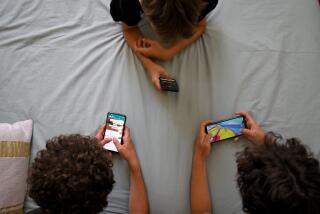How your cellphone betrays you
There’s a traitor in your pocket. Or your purse.
Your cellphone is ratting you out.
Stores can keep track of who you are and what you buy -- unless you pay cash. Now they can also use your cellphone -- even without your permission -- to find out even what you’re just looking at or trying on.
Nordstrom, the high-end department store, began using a technology that can use the Wi-Fi signals in shoppers’ smartphones to follow them virtually throughout the store, from display to display, item to item, and check how long they spent looking at what, just as websites can do now.
Nordstrom isn’t the only company trying this out. At least Nordstrom put up a sign to let customers know what it was doing, and not all of them liked it.
But can stores legitimately argue that they don’t have to tell us they’re shoplifting our data, and presuming that we give permission for them to do so just by setting foot in their stores?
We’re finding this out not long after learning that clothing retail chains Urban Outfitters and Anthropologie got dinged for unlawfully collecting customers’ ZIP Codes -- harmless enough, you think, except that added to the other data they gather, it’s like handing out your address and a “sell me stuff!” sign.
That may not be far off, just as we now have to assume everything that happens in public can and may be recorded by a security camera or someone’s cellphone.
Maybe merchants will be kind enough to put up a sign informing us that if we don’t want them to track us, the burden is on us to put our phones in airplane mode or to disconnect the Wi-Fi before we start pushing that shopping cart. Yeah, I’ll be sure to remember that every time I pop into the market.
I do have a phone-sized version of a Faraday cage, a device named for the 19th century scientist of electromagnetism. It’s a silvery pouch that I can slip my phone into to block the kind of monitoring that Nordstrom did. A phone condom. But every extra obstacle to convenience makes it less likely that people will go to such trouble.
Not a lot of folks are going to mind being monitored by marketers. Not a lot of people are going to bother to protest. Maybe you don’t mind that companies are compiling a dossier on you, a profile of you and your shopping habits. “I’m not doing anything wrong” is the mantra that a lot of Americans offer up to shrug off this kind of tracking, governmental or mercantile.
And who decides what’s wrong? It’s not you; it’s the agency holding the information.
Will some legislature, some court declare that just owning a cellphone constitutes implicit permission for the government to track your call patterns? Or for companies to monitor your mercantile browsing? It could happen.
Is this some deal your cellphone carrier has made or is already making with retailers? Is someone making a lot of money off you, but it isn’t you? It may already be happening.
The 2002 movie “Minority Report” (based on a prescient story by the gifted Philip K. Dick) is becoming the “1984” of high-tech living, right down to its creepily customized advertising.
Some people may love it, an electronically generated voice personally welcoming them back, asking them how they liked the potato salad they bought last time, especially compared to the dill-flavored version they bought before that, and howzabout a coupon for your next potato salad purchase?
If you don’t care, just keep doing what you’re doing.
If you do, now’s the time to speak up. Just don’t do it via your cellphone.
ALSO:
Newton: L.A.’s five angry bosses
Women to L.A. City Hall: Remember us?
More to Read
A cure for the common opinion
Get thought-provoking perspectives with our weekly newsletter.
You may occasionally receive promotional content from the Los Angeles Times.







